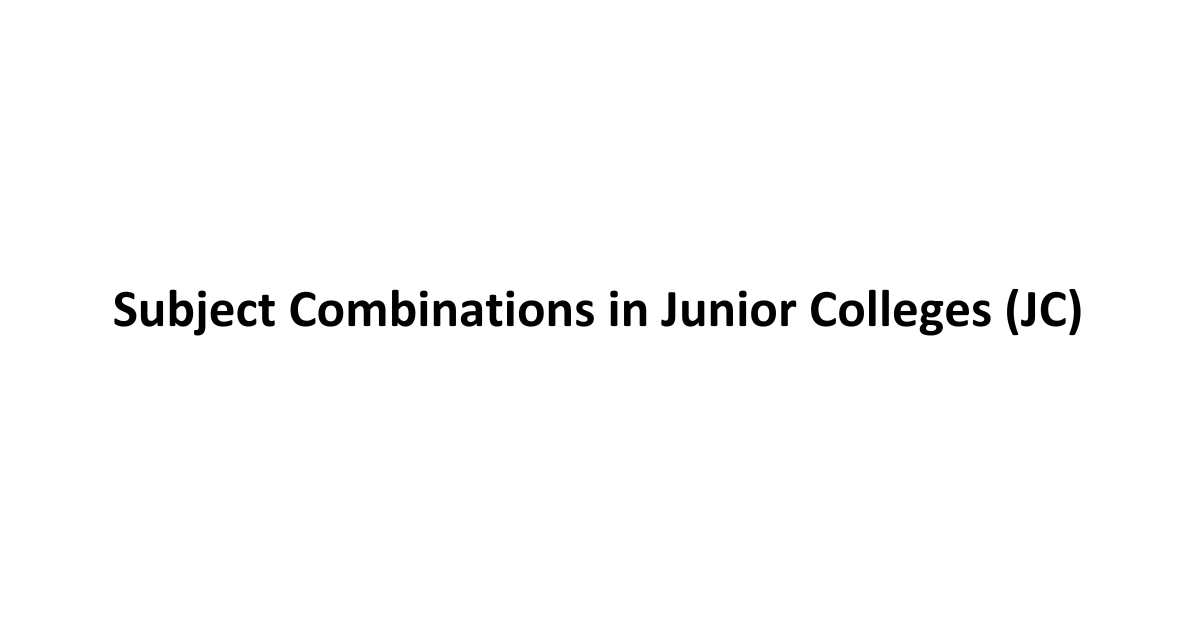
19 Oct Subject Combinations in Junior Colleges (JC)
The GCE A-Level curriculum in Singapore is a demanding and competitive system that requires students to choose a specific combination of subjects based on their academic interests and career aspirations. These combinations include 3 H2 (Higher 2) and 1 H1 (Higher 1) content-based subjects, Mother Tongue Language (MTL), General Paper (GP), and Project Work (PW). The selection of students for their chosen subject combinations is typically done through a merit-based allocation process due to the limited number of available slots in each subject. Here’s an overview of the key components of the GCE A-Level curriculum and the selection process:
1. Subject Combinations:
- Students are required to choose 3 H2 content-based subjects and 1 H1 content-based subject. It is mandatory to select at least one subject from a contrasting discipline to ensure a well-rounded education.
2. Mother Tongue Language (MTL):
- H1 MTL is a compulsory component of the A-Level curriculum for students in Singapore. It is essential for maintaining language proficiency and cultural knowledge.
3. General Paper (GP):
- H1 General Paper (GP) is another mandatory subject designed to enhance students’ critical thinking, communication, and general knowledge skills. It covers a wide range of topics and assesses students’ ability to express themselves effectively.
4. Project Work (PW):
- H1 Project Work (PW) is an integral part of the A-Level curriculum, focusing on research, collaboration, and presentation skills. Students work on group projects to investigate real-world issues and develop solutions.
5. Selection Process:
- Due to a limited number of places available for each subject, schools typically use a merit-based allocation process to determine which students are assigned to their chosen subject combinations.
- In cases where a subject is oversubscribed (more students interested in the subject than available slots), selection is based on academic merit. This includes evaluating students based on their L1R5 raw aggregate (excluding bonus points) or an equivalent scoring system. Performance in the relevant subjects also plays a significant role in the selection process.
6. H3 Subjects:
- H3 subjects are offered to students who excel academically and have a strong passion and aptitude for a particular subject area. These students must be willing to take on a more demanding workload beyond their regular subject combinations.
- To enroll in an H3 subject, students are required to study the corresponding subject at the H2 level as well. H3 subjects are only offered to students in JC2 (the second year of Junior College).
- Students may be considered for H3 subjects in various areas, including university-taught H3 programs from institutions like NUS (National University of Singapore), NTU (Nanyang Technological University), and SMU (Singapore Management University). There are also H3 programs such as the NUS-MOE Humanities And Social Sciences Research (HSSR) H3 and MOE-Cambridge H3.
In summary, the GCE A-Level curriculum in Singapore provides students with flexibility in choosing their subject combinations, but the selection process is highly competitive and based on academic merit. Additionally, the opportunity to take H3 subjects is available to academically strong students who are passionate about specific subjects and are willing to put in the extra effort to excel in them. The A-Level system aims to prepare students for higher education and future careers by offering a challenging and well-rounded education.



Sorry, the comment form is closed at this time.